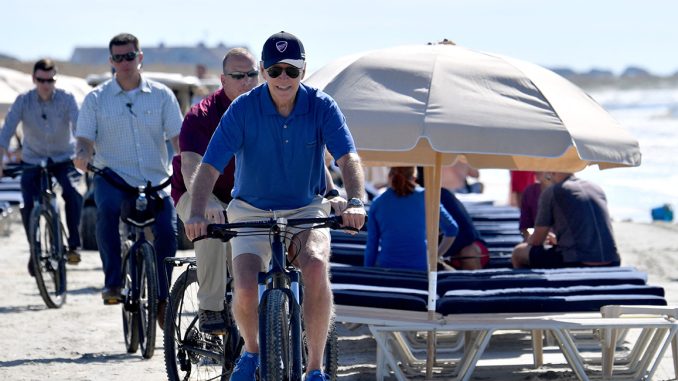
The middle class is demonstrably worse off under President Joe Biden, but that hasn’t stopped him from spending 40% of his presidency on vacation.
Many Americans would love such a lax job schedule, but they’re too busy working a second job to make ends meet. They can’t afford one day of vacation, let alone 382 like Biden.

On the few days Biden has actually been working, he has instituted policies that caused the financial plight of the middle class. Here are just a few examples.
Bidenomics is best defined by the government spending, borrowing, and printing too much money. That has caused inflation, which has eroded the value of Americans’ earnings. Real earnings (i.e., adjusted for inflation) have fallen about 5% under Biden.
The average American family’s weekly paycheck is about $230 bigger today, but it buys about $100 less compared to when Biden took office. That loss in value is a real tax.
The average American worker is paying more on his or her hourly wages in the hidden tax of inflation than in federal income taxes. That means inflation effectively has doubled what the average American worker pays to the government.
From his beach chair, Biden has presided over a 17% decline in the dollar’s value. Additionally, he is helping to destroy the dollar’s reserve currency status by wielding the dollar like a weapon, even confiscating dollars rightfully owned by some foreigners. That has shattered confidence in the dollar’s apolitical nature and emboldened China to try to dethrone King Dollar in international trade.
The 40-year-high inflation during Biden’s tenure has prompted a dramatic increase in interest rates, which is further hurting the finances of American families. Housing affordability is at one of the lowest levels on record. Not only has inflation made homes extremely expensive relative to incomes, but interest rates are more than twice what they were when Biden took office.
This explains why the monthly mortgage payment on a median price home today has more than doubled during Biden’s time in the Oval Office and on vacation. When he was inaugurated in January 2021, that monthly payment was $979. Today, it’s $2,059. It costs a family almost $13,000 more per year for the same house. And with rents at record highs, many Americans have no affordable housing options.
Even if you can afford a place to live, the Biden administration is making it as expensive as possible to keep the lights on, or to heat and cool your home.
By killing pipelines, denying permits and leases to drill, banning liquified natural gas transport by rail, levying new taxes on coal, oil, and natural gas, imposing “green” energy mandates, and more, the Biden administration has driven up the cost of energy.
Compared to when Biden became president, prices are up 60% for gasoline, 25% for electricity, 47% for diesel, 25% for natural gas, and 23% for propane. Unless your income has also gone up by those eye-watering amounts, energy has become less affordable for you under Biden.
With so many necessities becoming so expensive, millions of American families have resorted to credit cards to make ends meet, racking up a record $1 trillion in credit card debt. At the same time, credit card interest rates are at record highs. Americans never have been paying more in finance charges. That sure seems like a good time for the president to do something.
Then again, given how disastrous Biden’s policies have been, maybe it’s better for him not to do anything. Nothing is better than making additional mistakes.
If another vacation for the president means the country gets a vacation from any more Bidenomics, then Biden should feel free to serve out the remainder of his term from the most comfortable beach chair taxpayers can afford.
The only thing better would be if Biden simply put everything back to the way he found it. But that’s as unlikely as his consistently showing up for work.
This commentary originally was published by the Daily Caller News Foundation
Have an opinion about this article? To sound off, please email letters@DailySignal.com, and we’ll consider publishing your edited remarks in our regular “We Hear You” feature. Remember to include the URL or headline of the article plus your name and town and/or state.

